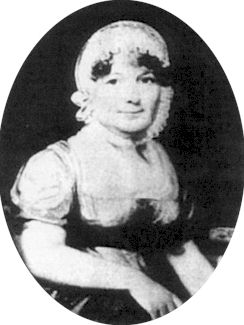|
 |

Part of the American
History & Genealogy Project |
Hannah Ogden Caldwell 1733 ~ 1780


Hannah Ogden Caldwell
Not numbered among the heroic, the strong, the dashing or the
prominent in the records of the Revolution but held in memory as
one of its martyrs, is the name of Hannah Caldwell, whose
barbarous murder was perpetrated not as ''an act of vengeance
upon an individual, but with the design of striking terror into
the country and compelling the inhabitants to submission."
So far from producing this effect, however, the crime aroused
the whole community to a state of belligerency before unknown.
One of the journals of the day says: "The Caldwell tragedy has
raised the resolution of the country to the highest pitch. They
are ready almost to swear enmity to the name of Britain."
And yet, there was probably no one in all the colonies who was
leading a quieter or more peaceful life than Hannah Caldwell.
She was the daughter of John Ogden of Newark, and Hannah Sayre,
a descendant of the Pilgrims. Her brothers were all stout Whigs,
and in 1763 she married the Rev. James Caldwell, pastor of the
first Presbyterian Church in Elizabethtown (the Elizabeth of
today) New Jersey, and he was one of the earliest to espouse the
cause of this country. Her husband acted as chaplain of the
Americans who occupied New Jersey, and his zeal in throwing the
influence of his eloquence for the cause of freedom rendered him
obnoxious to the enemy, and at length a price was put upon his
head. It is said that while preaching the Gospel to his people
he was often forced to lay his loaded pistols by his side in the
pulpit. The church in which he preached became a hospital for
the sick and wounded of the American army and the weary soldiers
often slept upon its floor and ate their hurried and scanty
meals from the seats of the pews so that worshippers were not
infrequently compelled to stand through the service. But even
this shelter the British and Tories, because of their anger
toward the pastor of the church, determined to destroy, and
accordingly it was burned with the parsonage on the night of
January 25, 1780.
The wife, Hannah Caldwell, fled into the interior of the state
with her nine children, but even here there seemed no peace, for
a body of Hessian and British troops had landed on the New
Jersey coasts and were proceeding to spread devastation and
terror throughout the colony. When informed of the enemy's
approach, the pastor put his elder children into a baggage wagon
which was in his possession as commissary, and sent them to some
of his friends for protection. But three of the youngest, with
an infant about eight months old, remained with their mother in
the house, Mr. Caldwell having no fears for the safety of his
wife and young family since he believed it impossible that
"resentment could be extended to a mother watching over her
little ones." He was called to join the force collecting to
oppose the British marauders, and early in the morning; while
his wife was handing him a cup of coffee, which he drank as he
sat on horseback, he saw the gleam of British arms in the
distance, and he put spurs to his horse. What followed is best
given in the simple terrible account of the crime. Mrs. Caldwell
herself felt no alarm. She placed several articles of value in a
bucket and let it down into the well, and filled her pockets
with silver and jewelry. She saw that the house was put in order
and then dressed herself with care that, should the enemy enter
her dwelling; she might, to use her own expression, "receive
them as a lady." She then took the infant in her arms, retired
to her chamber, the window of which commanded a view of the
road, and seated herself upon the bed. The alarm was given that
the soldiers were at hand.
But she felt confident that no one could have the heart to
do injury to the helpless inmates of her house. Again and again
she said: "They will respect a mother." She had just nursed the
infant and given it to the maid. A soldier left the road and,
crossing a space of ground diagonally to reach the house, came
to the window of the room, put his gun close to it and fired.
Two balls entered the breast of Mrs. Caldwell; she fell back on
the bed and in a moment expired.
After the murder Mrs. Caldwell's dress was cut open and her
pockets were rifled by the soldiers. Her remains were conveyed
to a house on the other side of the road, the dwelling was then
fired and reduced to ashes with all the furniture, but the
ruthless soldiers evidently desired her death to be known, that
such a fate might intimidate the countryside.
Some attempts were made by the Royalist party to escape the
odium of the frightful outrage by pretending that Mrs. Caldwell
had been killed by a chance shot. The actual evidence, however,
sets beyond question the fact that one of the enemy was the
murderer and there is much reason to believe that the deed was
deliberately ordered by those high in authority.
It seems peculiarly sad that such an end should have been the
fate of a woman known as Hannah Caldwell was for her
benevolence, serenity and sweetness of disposition, but the
memory of this martyr to American liberty will long be revered
by the inhabitants of the land, with whose soil her blood has
mingled.
Women of
America

Source: The Part Taken by Women in
American History, By Mrs. John A. Logan, Published by The Perry-Nalle
Publishing Company, Wilmington, Delaware, 1912.
|